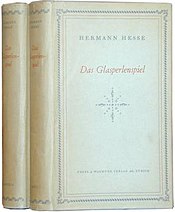 First German edition | |
| Author | Hermann Hesse |
|---|---|
| Original title | Das Glasperlenspiel |
| Translator | Mervyn Savill (1949), Richard and Clara Winston (1969) |
| Language | German |
| Genre | Fiction |
| Publisher | Holt, Rinehart and Winston |
Publication date | 1943 |
| Publication place | Switzerland |
Published in English | 1949 |
| Media type | print (hardback & paperback) |
| Pages | 558 |
The Glass Bead Game (German: Das Glasperlenspiel, pronounced [das ˈɡlaːspɛʁlənˌʃpiːl] ) is the last full-length novel by the German author Hermann Hesse. It was begun in 1931 in Switzerland, where it was published in 1943 after being rejected for publication in Germany due to Hesse's anti-Fascist views.[1]
"The Glass Bead Game" is a literal translation of the German title, but the book has also been published under the title Magister Ludi, Latin for "Master of the Game", an honorific title awarded to the book's central character. "Magister Ludi" can also be seen as a pun: magister is a Latin word meaning "teacher", while ludus can be translated as either "game" or "school". But the title Magister Ludi is somewhat misleading, as it implies the book is a straightforward bildungsroman, when, in reality, the book touches on many different genres, and the bulk of the story is on one level a parody of the genre of biography.[2]
In 1946, Hesse won the Nobel Prize in Literature. In honoring him in its Award Ceremony Speech, the Swedish Academy said that the novel "occupies a special position" in Hesse's work.[3] In 2019, the novel was nominated for the 1944 Retrospective Hugo Award for Best Novel.[4]
- ^ Liukkonen, Petri. "Hermann Hesse". Books and Writers. Finland: Kuusankoski Public Library. Archived from the original on 4 December 2007.
- ^ Theodore Ziolkowski, Foreword to The Glass Bead Game, p. xix. Picador. ISBN 0-312-27849-7. Ziolkowski cites Thomas Mann's recognition of the source of the book's humor as "the parody of biography and the grave scholarly attitude."
- ^ "The Nobel Prize in Literature 1946 – Hermann Hesse: Award Ceremony Speech". The Nobel Foundation. Retrieved 2014-02-20.
- ^ "1944 Retro-Hugo Awards". The Hugo Awards. 2019-07-28. Retrieved 2022-09-16.